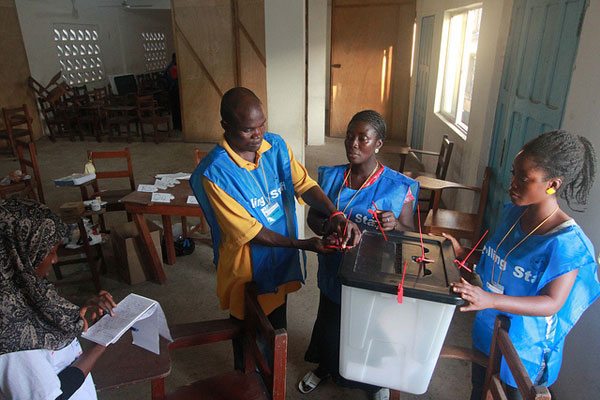
September 4, 2017; This is Africa
In the context of Kenya’s contested recent elections, Socrates Mbamalu asks a pertinent question: “Does Africa need international observers?” But the rest of his text tells the tale of the discrepancies between perceived and actual election observer mandates and of Africa’s complicity in international observers’ continued involvement in the continent’s electoral spaces. The former is the subject of several excellent articles, notably Paul Ejime’s in Pambazuka, so in this newswire I concern myself with the latter issue.
Election observation is an ancient practice that dates back at least to mid-nineteenth century Europe—possibly even earlier in Africa, where participants in leadership selection processes were tasked to ensure that established customary rules were respected. According to the African Union, this now-specialized art was used in post-independence Africa to avert political crises by promoting election integrity, given the prevailing volatile political dynamics at the time. It has since contributed to political stability across the continent and is now integral to global election custom.
Research suggests that some 80 percent of national elections are monitored, and not only in Africa. But not all elections are monitored in the same way. Only in 2006, for instance, did the United Kingdom amend laws to allow international election observation. Even then, election observation missions in those countries do not match the scale and diversity of those funded in Africa. Per the Declaration of International Election Observer principles to which many countries and some international organizations are signatories, one cardinal principle of election observation is that the “host state must invite or otherwise indicate willingness to accept” a mission. If international observation has become so inherent to African elections today, it is because Africa is inviting or not declining it, and is thus party to this lingering predicament.
Sign up for our free newsletters
Subscribe to NPQ's newsletters to have our top stories delivered directly to your inbox.
By signing up, you agree to our privacy policy and terms of use, and to receive messages from NPQ and our partners.
To suggest that overturning the 2017 Kenya election is about castrating Western imperialist control of African governance is really to lay bare how much stock—too much—has been vested in “foreign validation.” As a trained ECOWAS election observer, I know that election observation is only meant to add value to electoral processes; it is not a sacrosanct report of the integrity of the entire event. Again, international does not only mean Western. African observers who are not from an election country are also international. That said, the grotesque imbalance in external access to Western elections, compared to their involvement in Africa’s, calls into question the rationale for continued involvement.
I agree with Ejime that Kenya illustrates, as does the recent American election, that no one, not even the supposed pioneers of international election observation, has mastered all aspects of the craft of election management. Which brings us back to Mbamalu’s question. Does Africa still need international election observers?
My answer, that it depends, turns on two factors. Though African states are almost all multiparty democracies, they are at different stages with different needs that require case-specific evaluations of the value of international election observation. Second, observers are only as effective as the access they have to people and information. In Kenya, it would appear they were not in a position to assess certain alleged irregularities. This suggests a need for reforms either in election observation, in their terms of engagement, or both.—Titilope Ajayi













